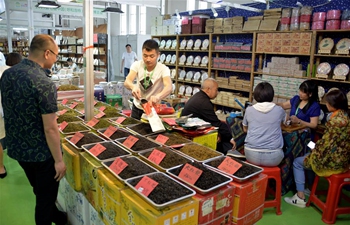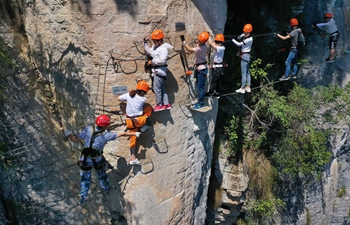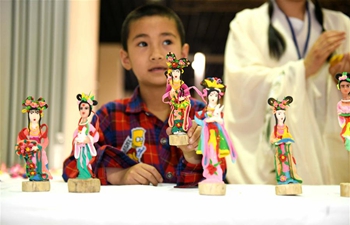
Audrey Azoulay, Director-General of the United Nations Educational, Scientific, and Cultural Organization (UNESCO), addresses an event dedicated to the Day of Bulgarian Enlightenment and Culture and of Slavonic Alphabet in Sofia, Bulgaria, on May 24, 2019. Bulgarian President Rumen Radev and Audrey Azoulay, Director-General of the United Nations Educational, Scientific, and Cultural Organization (UNESCO), here on Friday called for the promotion of linguistic diversity. (Xinhua/Zhan Xiaoyi)
SOFIA, May 24 (Xinhua) -- Bulgarian President Rumen Radev and Audrey Azoulay, Director-General of the United Nations Educational, Scientific, and Cultural Organization (UNESCO), here on Friday called for the promotion of linguistic diversity.
With today's increasing globalization, languages and culture disappeared every year, Radev said while addressing the key event dedicated to the Day of Bulgarian Enlightenment and Culture and of Slavonic Alphabet.
Every crippled and forgotten word detracted from the national and world treasures, Radev said.
With the disappearing words, a part of the memory of human civilization went away, Radev told the event, which was held in front of the National Library in Sofia, at the monument of the brothers Cyril and Methodius who in 855 invented the first alphabet for Slavic languages.
Bulgarians were called to preserve their language because Bulgarian Cyrillic alphabet was not only for the Bulgarian people, Radev said.
"It connects millions of people from different countries. It is our most valuable gift to the world cultural heritage," Radev said.
Azoulay, who was the guest of honor at the celebration, said each language carried heritage and knowledge that made it a fundamental element of the diversity of mankind.
UNESCO was based on the absolute conviction that namely the richness of the characteristics of each society enabled the building of the common, Azoulay said.
It is for this reason that her institution protected cultural heritage and linguistic diversity, she said.
Promoting linguistic diversity also meant to ensure that languages become bridges between individuals, teachers, scientists, pupils, students and children, Azoulay said.
Bulgarian Minister of Education and Science Krasimir Valchev, said in turn that Bulgarian alphabet, language and literature were the bond and mainstay of the national identity.
"Today, the Cyrillic alphabet is an alphabet of more than 300 million people and 70 languages," Valchev also said.











